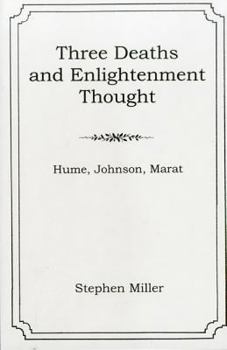Three Deaths and Enlightenment Thought: Hume, Johnson, Marat
In recent years there has been an extended debate about Enlightenment thought. Though many scholars have concluded that there were several "Enlightenments," some continue to make generalizations about the Englightenment and some speak about "the Enlightment agenda." After discussing the cult of the deathbed scene in eighteenth-century Britain and France, the author looks at three currents of Enlightment thought implicit in the deathbed "projects" of David Hume, Samuel Johnson, and Jean Paul Marat. Although Hume and Johnson hold profoundly different views of religion, their political thinking has much in common. Their reformist thought differs radically from what might be called the transformist thought of Marat, who hoped the French would become disinterested citizens whose civil religion was patriotism. The author argues that Enlightment thought was more varied and-in its reformist current-less hostile to tradition than many observers have allowed. Enlightment thought was less a cluster of ideas than a debate about a number of questions, especially the following: how to contain religious and secular fanaticism (or what was called enthusiasm); what are the effects of luxury; and what is the nature of the passions. There was, as J.G.A. Pocock says, "a family of Enlightments," and "there is room for the recognition of family quarrels..." Why look at deathbed scenes to chart the currents of Enlightment thought? Because an interest in deathbed scenes was widespread in eighteenth-century Britain and France. The final days of Hume stirred up a controversy that lasted for at least a decade and the final days of Johnson also attracted a great deal of attention, but Marat's death had the greatest impact of the three. His assassination gave impetus to the Jacobins' attempt to eliminate the influence of the church and greatly expand the influence of the state. Marat's project to transform France failed, but so did the projects of Hume and Johnson. Hume argued that religious belief was based on the foolish fear of
Format:Hardcover
Language:English
ISBN:1611481406
ISBN13:9781611481402
Release Date:July 2001
Publisher:Bucknell University Press
Length:219 Pages
Related Subjects
PhilosophyCustomer Reviews
0 rating





